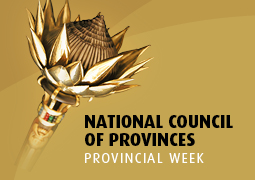
For a soundbite of the leader of the delegation, Mr Mohammed Dangor, click on the following link: https://iono.fm/e/1360155
Parliament, Thursday, 14 September 2023 - Gauteng Permanent Delegates to the National Council of Provinces (NCOP) have called for calm amid the violence and damage to the City of Tshwane that has characterized the labor dispute between the City and dismissed workers. They asked the Executive Mayor, Mr Cilliers Brink to find an amicable solution to the dispute to avoid further disruptions to current and future service delivery.
As part of their weeklong oversight visit to Gauteng, the delegates met with the Executive Mayor, Cabinet Members responsible for water and sanitation, and Gauteng provincial government leadership with a view to discuss corrective measures and roll out plans to deal with water and sanitation challenges affecting Hamanskraal and other areas of the city.
When asked about the dismissed one hundred and thirty-five municipal workers and if any mediation was solicited, Mayor Brink said the City is in financial distress and simply can’t afford salary increases.
Mediation with the South African Local Government Bargaining Council ruled in favor of the workers, but The City has not accepted the outcome, resulting in a fall-out.
Leader of the Gauteng permanent delegates, Mr Mohammed Dangor said the ongoing labour dispute will only exacerbate the water and sanitation challenges affecting residents of the City, particularly Hamanskraal, where a total of twenty-three people died during a cholera outbreak in May this year. He said the two parties must take the matter on arbitration.
Deputy Minister of Human Settlement, Mr David Mahlobo remarked that an independent investigation was conducted by the Water Research Commission (WRC) regarding the source of the cholera outbreak in relation to the sanitation infrastructure. He said even though the WRC results were inconclusive in determining whether the cholera outbreak and related fatalities related to water, it found that there were strains of bacteria related to cholera in the stream, especially in the Rooiwal Waste Water Treatment system.
He confirmed that at this stage the people of Hamanskraal are still receiving water through a catching system. The main source of water is received from the pipelines of Rand Water in Magalies and it has proven to be a credible source of water, he said.
While responding to questions from the NCOP delegates, Executive Mayor Brink reported that the Rooiwal Waste Water Treatment Plant, which supplies water to Hamanskraal and surrounds, is organically and hydrologically overloaded. He said this is compounded by the increase in population, exacerbated by internal migration and immigration, and as a result the infrastructure has not kept up with the demand.
From the discussions, it became apparent that most of the wastewater systems, including those in Tshwane are not being operated at the right levels, resulting in sewer running into communities and creating inhumane conditions for citizens. Due to these missteps, investment in infrastructure has not increased to cope with the demands of population and economic growth and the rising concerns of climate change.
Deputy Minister of Water and Sanitation, Ms Judith Tshabalala told the NCOP delegates that the Minister of Water and Sanitation and the Executive Mayor of the City of Tshwane entered into a foundational agreement principle to improve the water and sanitation infrastructure in Hamanskraal with the aim of enhancing the overall quality of life of its residents. She said under this agreement:
• a partnership exists between the Department and the City of Tshwane to collaboratively manage a project aimed at rectifying the infrastructure issues of Hamanskraal.
• A request would be made to National Treasury for additional allocations to fully support the project’s implementation.
• A competent and independent implementation agent would be appointed which is set to be fulfilled by the Development Bank of Southern Africa (DBSA).
• A Joint Steering Committee would be formed and jointly managed by the City of Tshwane and the DWS to oversee the Project.
• The project would be implemented in multiple phases, with the initial focus on addressing pollution concerns originating from the Rooiwal Wastewater Treatment Works (Rooiwal WWTW).
The permanent delegates noted the different interventions and some of the progress made towards building a viable provincial and municipal infrastructure for effective delivery of services to communities in Tshwane.
For media interviews with any of the Permanent Delegates to the NCOP, contact Xihlamariso Ngoveni on 0835291888 or by e-mail: xngoveni@parliament.gov.za.
ISSUED BY PARLIAMENT OF THE REPUBLIC OF SOUTH AFRICA

